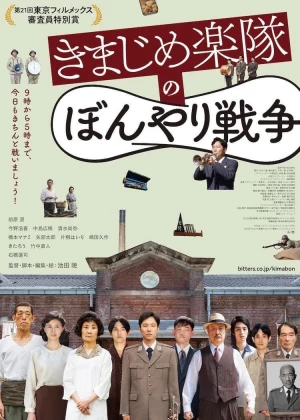The Blue Danube
Movie details

Akira Ikeda's Ambiguous Places was a real discovery, but I had never bothered to look deeper into his oeuvre for some reason. Desperate for some greatness, I stumbled upon his name again and I was delighted that I had somehow missed The Blue Danube [Kimajime Gakutai no Bonyari Sensô]. It's not the easiest film to track down, but options are available and fans of dry, senseless comedy would do well to make the effort. Ikeda is a director with a strong and unique signature which he loves to exploit quite vigorously, and that is exactly what I crave these days.
![screencap of The Blue Danube [Kimajime Gakutai no Bonyari Sensô]](/thumbs/img/articles/1200xauto/blue-danube-1.webp)
The combo of dry and absurd comedy is quite rare in the world of cinema. It's not too surprising I guess, films cost a lot of money and you need a rather niche and particular sense of humor to appreciate it, but that makes Ikeda's work all the more special. His laughs thrive on stone-cold silliness and endless repetition, turning the mundane into the absurd. And all of that is mimicked in the stylistic elements. Directors like Dupieux and Matsumoto, and films like Death by Death are distant relatives of Ikeda's The Blue Danube, but there's nothing quite like this film out there.
The setup of The Blue Danube reminded me a little of Otomo's Cannon Fodder (part of the infamous Memories anthology). It's about the futility of a war where people have forgotten why they ever started it. Every day people go through the motions and over time they've adapted to this life. There's no ideology or big goal, just a faceless enemy on the other side of the river stuck in the same rut. It's a perfectly absurd setup that Ikeda is free to explore, making some astute points while never losing sight of the comedy of the situation.
Two villages have been at war with each other longer than most people remember. Every single day, people follow the same routines, but no real progress is being made. This changes when an engineer arrives in town and starts working on a new device that may tilt the balance. Meanwhile, a soldier is tasked to join the marching band. Nobody knows what the band is for, but as he practices his songs, he meets a young woman on the other side of the river. Even though they cannot speak, they bond playing music together. This makes him question the war that dictates every moment of his life.
![screencap of The Blue Danube [Kimajime Gakutai no Bonyari Sensô]](/thumbs/img/articles/1200xauto/blue-danube-2.webp)
The cinematography is proper but expected, when doing dry and offbeat comedy it helps to keep a still camera as an understated means of expressing the absurdity of a situation. Ikeda uses it to good effect as it actively reinforces the comedy, but it's not the most original of choices. The framing is stark and rigid, the use of color and lighting adds a bit of extra flair and the editing is well-timed (meaning some scenes drag on longer than needed for comedic effect). It's nothing exceptional, but better than you'd expect from a comedy like this.
The score wasn't quite as spectacular, but what would you expect from a war comedy about a trumpet player? There are some familiar tunes here and Ikeda finds some comedy in the music and sound design, but it's all very limited. The additional music sounded pretty basic and by the numbers too, but for a comedy, those aren't the worst qualities. It's never actively distracting or annoying, which certainly could've been the case considering the theme of the film. I just wish Ikeda could've extracted a bit more comedy from the score.
The Japanese are known for their more introverted performances, so it's no surprise that they fare well in deadpan comedies. Ikeda has a great eye for picking characterful actors, both on the male side (Renji Ishibashi) and the female side (Karagiri Hairi) of the cast. The actors are an integral part of the comedy and they all deliver. It's not a huge cast and their dialogue tends to be rudimentary and repetitive, but almost every single one of them manages to leave a sizable impression, just with stark expressions and comedic timing. It's rare to find a perfect cast, but this film sure came close.
![screencap of The Blue Danube [Kimajime Gakutai no Bonyari Sensô]](/thumbs/img/articles/1200xauto/blue-danube-3.webp)
The first 30 minutes or so are probably the most challenging. Getting to know the characters and setup in a film that isn't very narrative-focused is always a tad trickier, I can only imagine what it must be like for people who don't gel with Ikeda's sense of humor. The latter is going to be essential in getting any enjoyment out of The Blue Danube, as there aren't any major shifts in style and pacing. Ikeda does his thing from start to finish while slowly evolving the various plot lines. Some may find it dull and unadventurous, but considering this type of film is quite uncommon, I loved seeing Ikeda double down on his style.
After just two films I feel confident in saying Akira Ikeda is a director I'll trust blindly in the future. The Blue Danube's blend of bone-dry comedy and everyday absurdities is presented with the necessary flair and conviction to make this an exceptional experience. It's certainly not going to be for everyone, Ikeda's appeal is niche by default, but fans of the absurd and the deadpan would do well to make a bit of an effort tracking this one down. It's not every day a film like this gets made, and it's even rarer to see it done this proficiently. From now on, I'm calling myself an Ikeda fan.